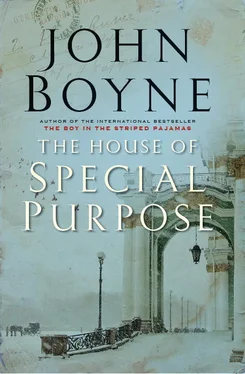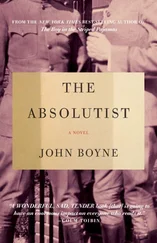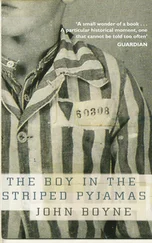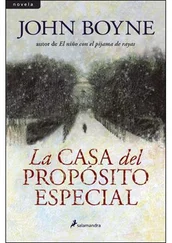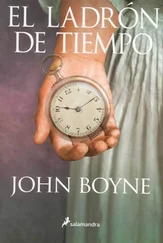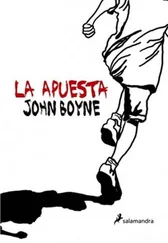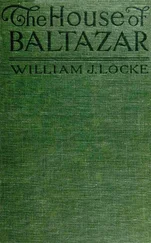He considered these remarks quietly for a few moments and I wondered whether I was debasing myself a little too much before him, but I had prepared these lines on my walk towards Bloomsbury in order to secure the position and thought them humble enough to satisfy a potential employer. I didn’t care if they made me sound like a servant. I needed work.
‘Very well, Mr Jachmenev,’ he said finally, nodding his head. ‘I think we’ll take a chance on you. A trial period to begin with, let’s say six weeks, and if we’re happy enough with each other at the end of that time we’ll have another little chat and see if we can’t make the position permanent. How does that sound?’
‘I’m very grateful, sir,’ I said, smiling and extending my hand in a gesture of friendship and appreciation. He hesitated for a moment, as if I was taking a tremendous liberty, before directing me to a second office where my details were recorded and my new responsibilities outlined.
I remained in the employment of the library at the British Museum for the rest of my working life, and after my retirement I continued to visit almost every day, spending hours at the desks I used to clear, reading and researching, educating myself. I felt safe there. There is nowhere in the world I have ever felt so safe as within those walls. My whole life I have waited for them to find me, to find us both, but it seems we have been spared. Only God will separate us now.
It is true that I have never been what you might term a modern type of man. My life with Zoya, our long marriage, was of the traditional variety. Although we both worked and returned home from our jobs at similar times in the evening, it was she who prepared our meals and took care of such domestic chores as laundry and cleaning. The idea that I might help was never even considered. As she cooked, I would sit by the fire and read. I liked long novels, historical epics, and had little time for contemporary fiction. I tried Lawrence when it seemed daring to do so, but I stumbled over the dialect, Walter Morel’s dost s and nimbler s and threp’ny bit s, Mellors’ niver s and theer s. Forster I found more attractive, those earnest, well-intentioned Schlegel sisters, the free-thinking Mr Emerson, the wild Lilia Herriton. Sometimes I might feel moved to recite a particularly affecting passage aloud and Zoya would turn away from the sweating of the roast or the broiling of the pork chops to rest the front of her hand against her forehead in exhaustion and say What, Georgy? What is it you’re telling me? as if she had half forgotten that I was even in the room. It seems wrong that I did not play a greater part in the running of our home, but this was how family life was conducted in those days. Still, I regret it.
I had not always intended my life to be quite so conservative. There were even moments, fleeting instances over more than sixty years together, when I resented the fact that we could not stand clear of our parents’ shadows and create our own individualized lifestyle. But Zoya, perhaps in recognition of her own childhood and upbringing, desired nothing more than to create a home which would fit in exactly with those of our neighbours and friends.
She wanted peace, you see.
She wanted to blend in.
‘Can’t we just live quietly?’ she asked me once. ‘Quietly and happily, behaving like others behave? That way, no one will ever notice us.’
We made our home in Holborn, not far from Doughty Street, where the writer Charles Dickens lived for a time. I passed his house twice every day as I walked to and from the British Museum and, as I became more familiar with his novels through my work at the library, I tried to imagine him seated in the upstairs study, crafting the peculiar sentences of Oliver Twist . An elderly neighbour once told me that her mother had cleaned for Mr Dickens every day for two years and that he had presented her with an edition of that novel with his signature upon the frontispiece, which she kept on a shelf in her parlour.
‘A very clean man,’ she told me, pursing her lips and nodding in approval. ‘That’s what Mother always said about him. Fastidious in his ways.’
My morning routine never changed. I would wake at half past six, wash and dress, and step into the kitchen by seven o’clock, where Zoya would have tea and toast and two perfectly poached eggs waiting for me on the table. She had a miraculous technique for preparing the eggs so that they retained their oval shape outside of the shell, a talent she put down to creating a whirlwind effect in the boiling water with a whisk before plunging the albumen and the yolk inside. We said little to each other as I ate but she would sit at the table next to me, refilling my mug of tea when it ran low, taking my plate away the moment I had finished and rinsing it beneath the tap.
I preferred to walk to the museum, regardless of the weather, in order to take some exercise. As a young man, I was proud of my physique and I worked hard to maintain it, even as middle-age approached and I became less enamoured by my reflection in the glass. I carried a briefcase and Zoya placed two sandwiches and a piece of fruit inside it every morning, alongside whatever novel I was reading at the time. She took such good care of me and, through the nature of daily repetition, I rarely thought to comment on her kindness or offer her my thanks.
Perhaps this makes me sound like an old-fashioned creature, a tyrant making unreasonable demands of his wife.
Nothing could be further from the truth.
In fact, when we were first married, in Paris in the autumn of 1919, I could not bear the idea of Zoya placing herself in a servile position towards me.
‘But I am not waiting upon you,’ she insisted. ‘It gives me pleasure to take care of you, Georgy, can’t you see that? I never imagined I would have such freedoms as this, to wash, to cook, to maintain my own home as other women do. Please don’t deny me something that others take for granted.’
‘That others complain about,’ I replied with a smile.
‘Please, Georgy,’ she repeated, and what could I do but accede to her demands? Still, I remained uneasy with this for some years, but as time went by and we were blessed with a child, our routines took over and I forgot about my initial discomfort. The arrangement suited us, that is all I can say of it.
My shame, however, is that she has looked after me so well throughout our life together that I find myself unable to cope with basic responsibilities now that I am alone in our home. I know nothing of cooking and so eat cereal for my breakfast every day, flakes of dry oats and bran, fossilized currants made soggy by the addition of milk. I take lunch at the hospital at one o’clock when I arrive on my daily visit. I eat by myself at a small plastic table overlooking the infirmary’s unkempt garden, where the doctors and nurses smoke side by side in their pale-blue, almost indecent scrubs. The food is dull and bland but it fills my stomach and that is all I ask of it. It is basic English food. Meat and potatoes. Chicken and potatoes. Fish and potatoes. I imagine that some day the menu will offer potatoes and potatoes. It can excite no one.
Naturally, I have grown to recognize some of my fellow visitors, the widows and widowers in waiting who wander the corridors in terrified loneliness, deprived for the first time in decades of their favourite person. We have a nodding acquaintance, some of us, and there are those who like to share their stories of hope and disappointment with each other, but I avoid conversation. I am not here to form friendships. I am here only for my wife, for my darling Zoya, to sit by her bedside, to hold her hand in mine, to whisper in her ear, to make sure she knows that she is not alone.
Читать дальше
